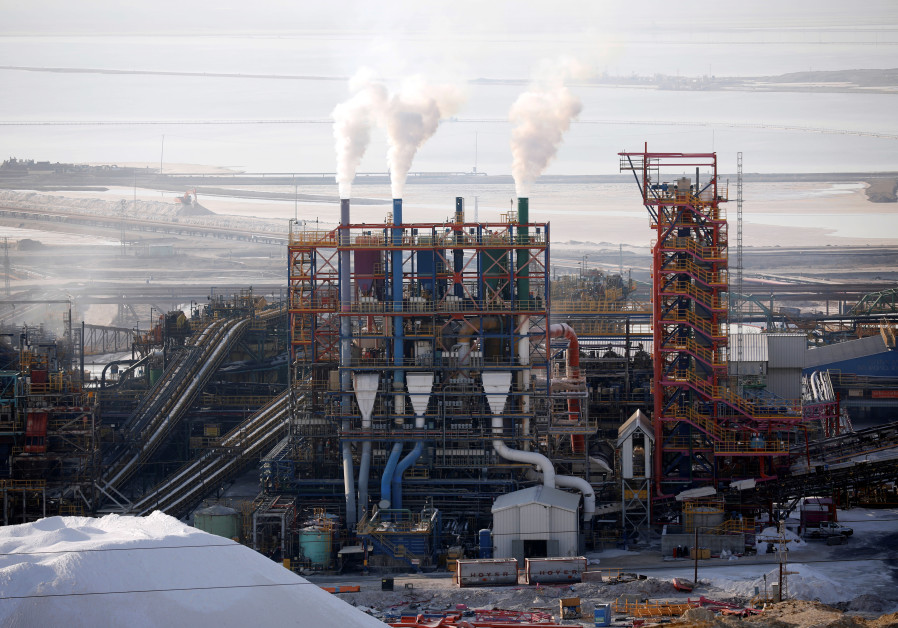Government report: 28% increase in cancer-linked air pollution in 2018

A general view shows Dead Sea Works factory at the Dead Sea. (photo credit: REUTERS)
Emissions of suspected or recognized carcinogenic substances in Israel increased by 28% in 2018 due to the burning of landfill waste, according to annual data published Monday by the Ministry of Environmental Protection.
Routine emissions, excluding landfill fires but including offshore gas production operations, decreased by 4% in 2018 and have dropped by a total of 8% since 2012. Without offshore gas production, however, routine emissions have decreased by some 46% since 2012.
The annual report, which includes data on emissions from the country’s 570 largest factories, revealed that the increase in carcinogenic pollutants primarily resulted from the burning of waste at three landfills in the Negev: Effe landfill, near Arad; Duda’im landfill, north of Beersheva; and the Yeruham landfill.
In light of the findings, the ministry has commenced enforcement proceedings against the Effe and Duda’im landfills. Last month, however, another large quantity of waste was burnt in Duda’im, which is likely to be reflected in next year’s annual figures. In response to the increased emissions, the Municipality of Yeruham has opted to permanently close its nearby landfill.
Fires occurring at waste sites – including municipal solid waste, agricultural waste and landfill waste – accounted for 60% of all suspected or recognized carcinogenic substance emissions, as well as 20% of PM10 particulate matter emissions and 11% of non-methane volatile organic compounds (NMVOC).
According to the report, emissions from the industrial Haifa Bay area – traditionally a major source of pollution – continued to decrease last year.
Emissions of pollutants into the air from Haifa Bay decreased by 10% to 45% in 2018, including a 23% reduction in emissions of NMVOCs. The decrease primarily follows the closure of the Haifa Chemicals factory in the area in August 2017. Since 2012, the ministry says, the emission of harmful pollutants from Haifa Bay has decreased by 45% to 81% in total.
Sulfur oxide emissions from Haifa Bay, however, did rise by 16% in 2018, primarily due to increased activity by Shemen Industries and a 12% increase in emissions by oil refining firm BAZAN Group.
“The data from the report shows that the significant work invested by the ministry at Haifa Bay has provided important results,” said Environmental Protection Minister Ze’ev Elkin.
“However, due to several fires at major waste landfills, there has been a worrying increase in the quantity of emissions of various pollutants, so we must move forward as quickly as possible in implementing our strategic plan for significant reductions in landfills in Israel.”
The ministry’s waste targets aim to significantly reduce landfill disposal wastes from 80% today to 26% by 2030.
The report also showed a continuing sharp decline in consumption of mazut – a heavy, low quality fuel oil used in industry – and an increase in consumption of natural gas by Israeli factories.
Factories reported a 13% decrease in mazut consumption in 2018, and a cumulative reduction of 83% since 2012 (from 102 to 79 factories in total). Natural gas consumption, however, increased by 17% in 2018 and has soared by 123% since 2012.
Responding to the report, Adv. Jamila Hardal Wakim from NGO Citizens for the Environment welcomed that figures regarding burning of waste were finally included in the report, but warned that they remained incomplete.
“As serious as they are, they are only partial and reflect emissions from major landfill sites and licensed transit stations,” said Wakim. “But they do not take into account the daily emissions from mixed waste incineration, including electronic waste, the hundreds of unregulated transit stations and pirate waste sites located everywhere and next to nearly every town in the country.”
Dr. Revital Goldschmidt from the Environmental Research Center in Haifa called for stricter regulations and increased enforcement across polluting industries.
“Only the closure of polluting industries is an effective step to reduce environmental pollution,” said Goldschmidt. “Both Haifa Bay and Ashdod, the two Israeli capitals of petrochemicals, are suffering under severe pollution.”
`; document.getElementById(“linkPremium”).innerHTML = cont; (function (v, i){ });





Comments are closed.